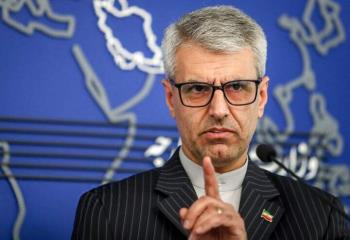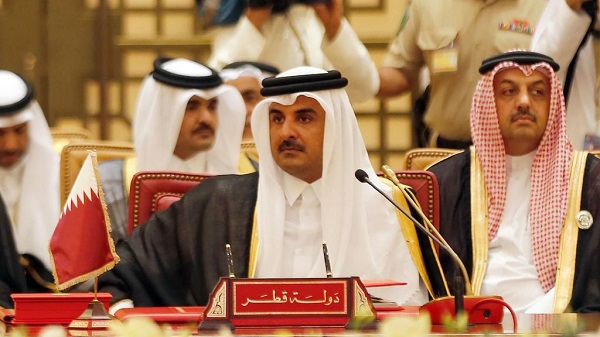Alwaght- Less than a week to the scheduled (Persian) Gulf Cooperation Council’s 41st summit in Riyadh, the clouds of uncertainty and ambiguity are covering the meeting.
While Kuwait in early December announced a final settlement to the Qatar crisis and end of all differences, now there are serious doubts about the participation of all of the leaders of the member states that would mark a symbolic end to the crisis in this regional bloc.
One of the most important factors causing such doubt is the absence of the Qatari foreign minister from the virtual meeting of counterparts in the Council that was held on Monday with the aim to coordinate the upcoming summit.
In fact, Qatar downgraded its representation in the foreign ministerial meeting and instead of Foreign Minister Mohammad bin Abdulrahman Al Thani sent the Minister of State for Foreign Affairs Sultan bin Saad al-Muraikhi.
The Cooperation Council’s meetings since 2017 are held annually in the absence of Sheikh Tamim bin Hamad Al Thani. So, holding this year’s meeting with the presence of the leaders of the six member states is necessary to vindicate the recent weeks' words about the end of the crisis.
But what does make Sheikh Tamim take cautious steps?
Reluctant rapprochement signal with repeated accusations
To understand the reason behind the lower-ranking representation of Qatar at the foreign ministers meeting, while the foreign minister was supposed to be present as it was the first gathering since the Kuwait peace announcement, we need to track the course of the events since the day of the agreement to end the crisis.
First, following the announcement that came after a trip to the region of the Trump advisor Jared Kushner who pressured the blockading countries to review their anti-Qatari measures, no sign of reconciliation and burying the hatchet showed up between Saudi Arabia and Qatar.
A couple of days after the Kuwait deal was declared, Abdel Khaliq Abdullah, an ex-advisor to Abu Dhabi Crown Prince Mohammed bin Zayed, in a Twitter post reacted to the reports of the agreement saying: “Train of the Arab reconciliation will not move from its place a millimeter without the knowledge and stated agreement of the Emirates.”
In fact, the UAE, which normalized its diplomatic ties with the Israeli regime and announced plans to pull out its forces from the Yemen war and thus is less concerned about the changes in the White House, and also because it advertises itself as an emerging pole in the Arab world and regional developments and wants to move out of the domination of the big brother Saudi Arabia, is neither willing nor obligated to mend ties with Doha.
Another issue that worked against the atmosphere of Arab reconciliation was the verbal clash between Doha and Manama over the fishing regions. On December 12, Qatar’s coast guard seized a Bahraini fishing boat in its territorial waters. This was Bahrain’s third intrusion into the waters disputed with Qatar in the past two months. Following the incident, informed sources said Bahrain intensified its dispute with Qatar and intend to reopen the past sea border disputes with Doha, while the case was closed down by the International Court of Justice. In a ruling issued on March 16, 2001, Janan, Al-Zebarah, and Fash Al-Dabil were announced as Qatar sovereignty. Concerning the sea navigation, the court ruled that Qatari commercial vessels had the right to peaceful navigation in Bahrain’s territorial waters close to the Hiwar and Al-Bar islands.
But after the fishing boat seizure, Bahrain lawmakers published a statement in which they claimed that Doha violated the rights of Bahraini fishermen and sailors and insisted that there should be no reconciliation with Qatar.
The tense atmosphere continued throughout the virtual meeting of the foreign ministers, disclosing that although Saudi Arabia has taken steps towards a rapprochement under Washington's pressures, other blockaders are far from having such an intention.
Addressing the meeting on Monday, Bahraini Foreign Minister Abdullatif bin Rashid Al Zayani repeated accusations against Doha of funding terrorism and meddling in regional states’ affairs.
“We set out national security and stability as our top goal, continue to fight terrorism and its funding, counter the discourse of incitement to violence and hated, and oppose intervention in our countries. We fight all forms of outlaw entities and boost our cooperation to address the demands of our nations,” he said.
Qatar’s strategic patience
The other side of the inconsonance of the stances and statements with the reconciliation agreement and developments is the new chapter of relations formed within the (P) GCC after the 2017 crisis between the Saudi-led bloc and Qatar that resulted in reduced political, economic, and military dependence of Doha on the bloc. Actually, by defying the steep turn of the sanctions, imposed by Saudi Arabia, Bahrain, the UAE, and Egypt, Qatar is now thinking about setting a new order of relations in the equations of power in the Council that would include reduction of Doha commitment to the foreign policy lines drawn by the bloc, especially that the (P) GCC has no bold role in the regional equations and only a name is left of it.
So, an essential issue for the Qatari emir about presence at the summit is that how Qatar’s improved international position will be saved while making such a concession to the Saudi Crown Prince Mohammed bin Salman. In fact, what so far is named as reconciliation is simply a statement and reconciliatory stances by Riyadh that stopped short of lifting the all-out sea, air, and land blockade or quitting the 13 preconditions set by the four countries for any re-established ties. Perhaps, holding the Saudis waiting behind the détente doors is more yielding for Qatar than its three and half years of strategic patience.



























